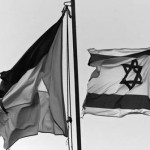Thursday
Aug262010
Middle East Inside Line: "Warm" Turkish-Israeli Relations; Latest on Israel-Palestine Talks
 Thursday, August 26, 2010 at 18:27
Thursday, August 26, 2010 at 18:27  Ankara's "Friendly Face" to Israel: Weeks after reports alleging that Ankara had been threatened by the US with a cut-off of military transfers unless ties with West Jerusalem improved, senior Turkish officials currently visiting Washington announced their commitment to preserving warm relations with Israel.
Ankara's "Friendly Face" to Israel: Weeks after reports alleging that Ankara had been threatened by the US with a cut-off of military transfers unless ties with West Jerusalem improved, senior Turkish officials currently visiting Washington announced their commitment to preserving warm relations with Israel.The Latest from Israel-Palestine-Washington: Haaretz reports that the Palestinian Authority submitted a paper, prepared by Israeli jurists, saying that --- contrary to Prime Minister Benjamin Netanyahu's claim --- Israel has the authority to freeze construction on private land. The PA demanded that the Obama Administration press for an extension of the freeze to East Jerusalem fr.
However, Haaretz reports, from sources "close to the Obama Administration", that Washington will be urge Palestinians to soften their stance on Deputy Prime Minister Dan Meridor's proposal offering the continuation of construction in large settlement blocs but not in isolated settlements. In response to this "concession", land from Area C, which is both governed and controlled by Israel, will be transferred to Area B which is controlled by Israelis but governed by Palestinians.
Foreign Minister Avigdor Lieberman, who has proposed the continuation of settlement constructions in parallel with the "natural growth rate", stated on Wednesday that the de facto freeze in East Jerusalem cannot continue after 26 September:
Presently there are 1,000 housing units on the table in Ramot, another 600 housing units in neighborhoods like Gilo, east Talpiot, Har Homa and Pisgat Ze’ev. What, does someone expect that we will continue to freeze 1,600 housing units that went through all the [bureaucratic] procedures?
Pressure on Netanyahu Inside Israel: Speaking at a conference on Tuesday, Kadima Chairwoman Tzipi Livni accused Netanyahu of not being able to prevent the discrediting and delegitimising of Israel at the international level. She welcomed Netanyahu's decision to enter direct talks but warned him: "I hope the prime minister won't enter the talks as a favor to the Palestinians, or to the US, but rather that he will understand that this is in our best interest."
Ministers from the Labor Party are reportedly applying pressure on party chairman Ehud Barak to leave the coalition if Netanyahu turns toward the extreme right and clashes with Obama next month.




